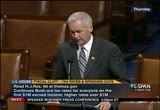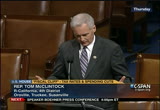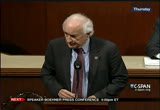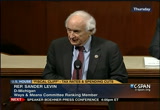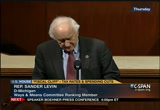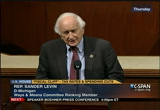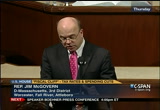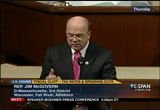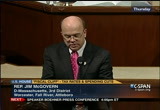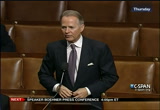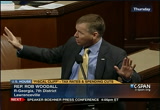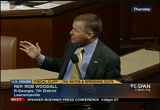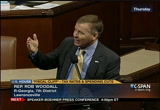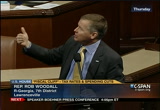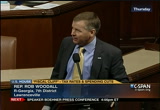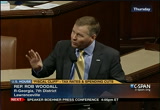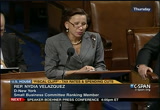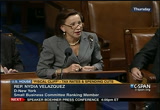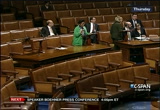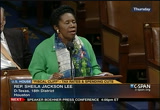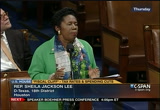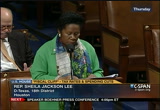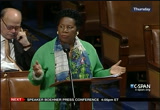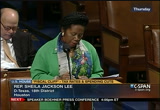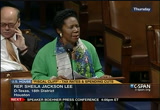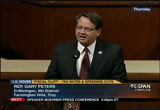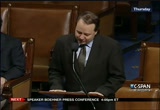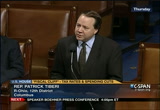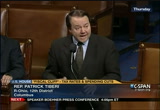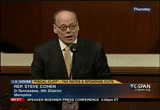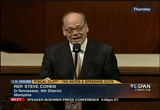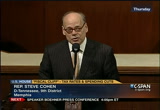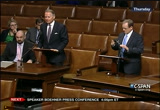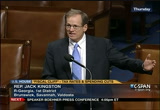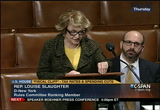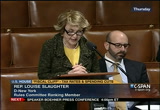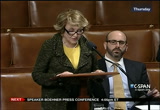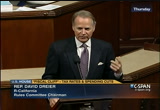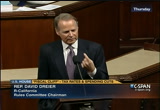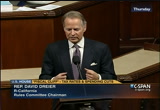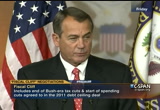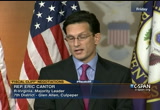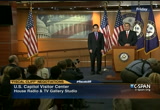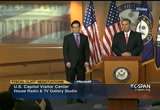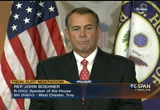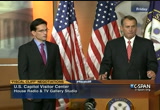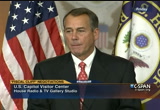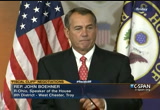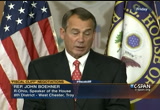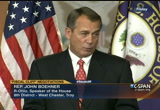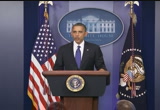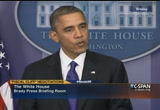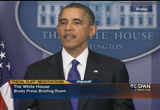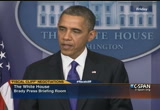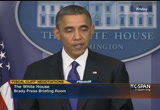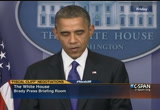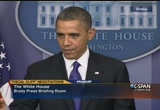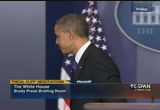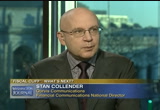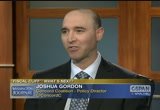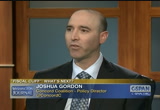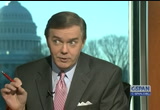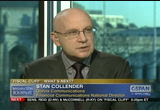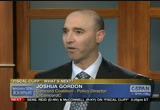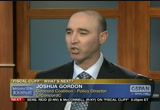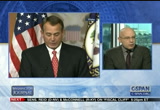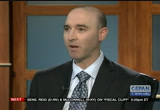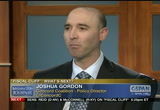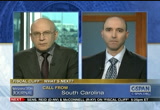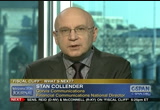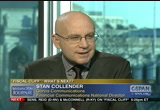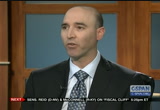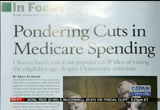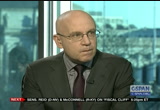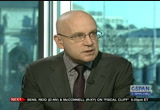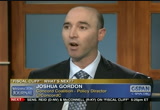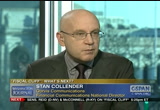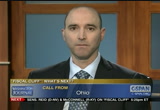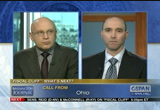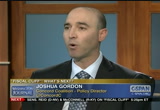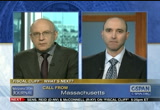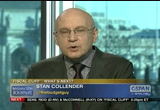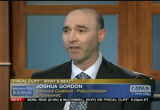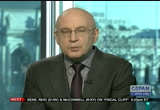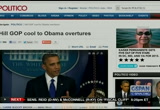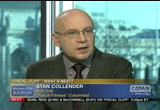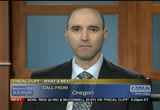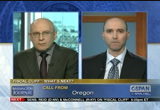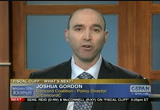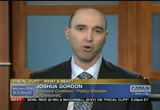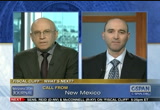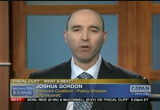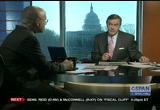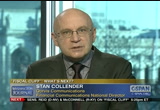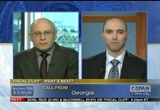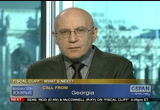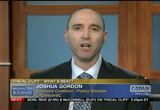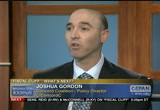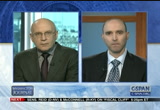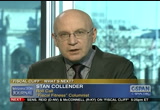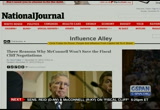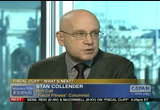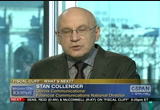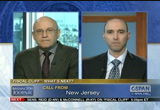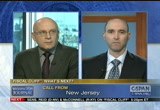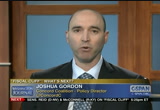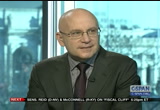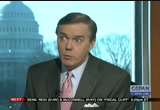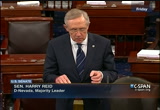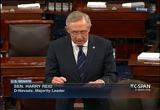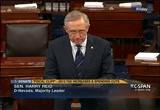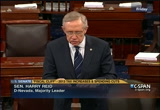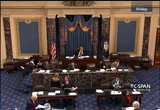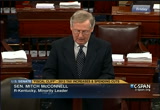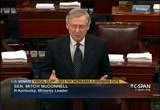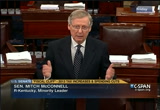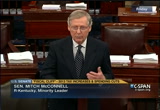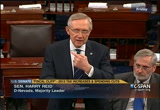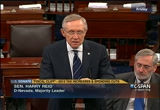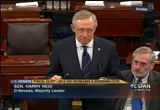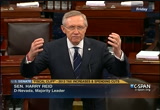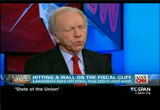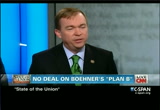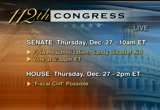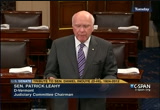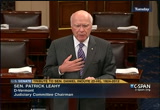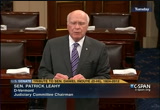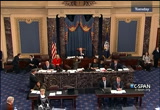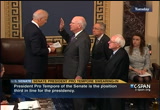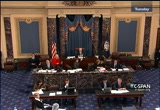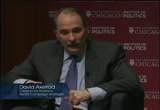tv Gun Control Laws CSPAN December 23, 2012 3:33pm-6:00pm EST
3:33 pm
the rich crusade. 700,000 lost jobs. house republicans now have a choice. we can try to save as many americans as the president will permit, or we can end up at an impasse that ensures taxes go up on everyone. let us pass this bill. if it does not work, let us pass whatever level the president will agree to. is not as if we have not repeatedly warned him. my conservative colleagues say sparing some people these tax increases is tantamount to racism among others. a lifeguard who sees 10 swimmers drowning, if he can only save nine, that does not mean he has drowned the 10th one. no lifeguard would be worth his
3:34 pm
pay if he said, my principle is nobody should drowned off my beach. if i cannot save them all, i will not save any. americans watched as thousands of middle-class jobs are sacrifice on the ideological obama next year, this country will be a lot wiser. until then, let's save the weekend. >> the done in's time has expired. >> i am pleased to yield three minutes. >> the gentleman from michigan is recognized for 3 minutes. >> this is an important moment. these bills move the nation dangerously closer to the cliff.
3:35 pm
with only 11 days before our nation will go over. they make finding common ground far more difficult, with only 11 days left to find it. these bills are not a plan. they are a ploy. they are to know where. they undermine trust so essential for agreement. we just heard it. the republicans claim letting the tax rate go up from 35 to 39.6 on income over $1 million is not a tax hike because it would happen on its own. then they say if the tax cut would go up on income below $1 million by happening on its own, it would be the biggest tax increase in history. that is inconsistent. far worse than the hypocrisy is
3:36 pm
the way they design their tax provisions. for those with incomes over $1 million, they provide a tax cut of at least $50,000. they raise only one-third of the revenue contained in the speaker's discussions in the white house and far less than proposed by the president. talk about undermining trust. they would raise taxes on 11 million middle-class tax payers. there is silence, stone hearted silence on 2 million unemployed workers looking for work who would lose their insurance immediately on december 29. silence on the 27%.
3:37 pm
in a deeply cynical move, so cynical, the republicans have decided to offer another bill to put off some of the sequester. they pay for it how? deep and ugly cuts impacting seniors, kids. the republicans are tying themselves into knots. in doing so, they are tying into knots the chances for our nation not going over the cliff. vote no on these bills that take us backward, that undercut trust, that increase the chances of going over the fiscal cliff. this is not a plan. this is a ploy.
3:38 pm
>> i would like to inquire of my friend how many speakers she has remaining. it looks like a couple. i will reserve the balance of my time. >> i would be happy to tell you. four. >> the gem and reserves. >> thank you. three minutes right now. the gentleman from massachusetts. >> recognize for three minutes. >> thank you for the time. just when i thought the process could not get worse, last night, the republicans reached a new low. we were originally told we were meeting on the plan the tax bill, which continues the prow republican tradition of protecting tax cuts for the wealthy at the expense of middle class families and poor people.
3:39 pm
then we were told there would be a new bill that was introduced in the middle of the hearing. i am not sure what to call this one. plan b 2.0. it cuts $36 billion from the program, taking food off the tables of struggling american spirit millions of households would see a cut in their benefits. millions of families would have less food tomorrow than they do today. hundreds of thousands of kids would lose their access to free school meals. it is enough to make ebenezer scrooge embarrassed.
3:40 pm
the bill threatens medicare, children's programs, education, infrastructure, and it threatens our economy as a whole. does anyone really believe there is not a single dollar to be saved anywhere in the pentagon? the american people have spoken. they have made it loud and clear they want a balanced approach that casts the wealthiest americans to pay a little bit more. it protect our seniors, children, and our most vulnerable neighbors. the republican leaders refuse to listen. let me say another thing. i would say my republican freshman colleague -- i remember the promises of things you said would change. i would say, you own this now. you have officially become part of the problem, if not the problem. it is a vote against accountability.
3:41 pm
let me say this, my republican friends have made it on fashionable to worry about the poor and the elderly and the vulnerable. i urge my colleagues not to turn your backs on the most needy. let's balance our budget in a way that does not lower the quality of life or decrease the standard of living. we can do so much better. instead of doing this, you should be negotiating with the president. go back to the negotiating president and stop the game. >> i yield 5 minutes to my friend from georgia, a very hard-working member of the house committee. >> 5 minutes. >> i think my chairman for yielding me the time. i came down here to talk about the tax policy and my support
3:42 pm
for the rule, but when folks back home ask me what is wrong with this place, i will start talking about this debate. there is a serious topic on the floor right now. this fiscal cliff, this is a serious issue for our economy, working families, and for small businesses we are counting on bringing us out of recession. everyone believes that. as we are down here trying to have that discussion, in the short, 11 days we have left, i hear that our tax package, which does exactly what the president asks, i think it is wrong, i think we ought to keep tax rates low for everyone, but the president says no. this bill does that.
3:43 pm
as my friend reminded me, when i ran as part of this freshman class, i said, let's try to make things more simple. we know what happens at the end of this year. we know the christmas tree bills that come rolling to the floor, where you handle 100 different unrelated things at a time. i would be interested in pulling folks without a voting card. i would be interested in knowing what folks listening to this debate believe is happening. i have been told that this tax bill throws americans off unemployment. it does no such thing. no such thing. do we need to deal with unemployment? yes we do. in an unemployment bill. i have been told this tax bill to cut payments to doctors. it does no such thing. there is not one line in this bill that does any such thing. do we need to deal with medicare? of course. do we need to jumble all of
3:44 pm
these things together in a straightforward tax bill? the answer is no. i am told by my friend is not just silence on these issues. it is stone hearted to be silent. who believes we advance this debate by calling the absence of a provision stone hearted on the part of the authors? do not tell me about violating trust. do not tell me about how it is polls ought to work properly together. we have the opportunity right now. folks are throwing it away line by line by line. my friend comes to the floor and he says, this bill throws folks off food stamps. nonsense. every single time i go to a
3:45 pm
town hall meeting, folks believe that if only we eliminate the fraud in government, we will balance the budget. due to the spending, we are way far out of balance. fraud will not do it. that will not be enough. what the underlying bill does to eliminate the defense sequester cuts president obama has called dangerous, it says, the only people who should get food stamps are people who qualify for food stamps. that is right. the underlying bill says the only folks who should get food stamps are those who qualify. it turns out, like every federal program, there is fraud. some folks are receiving taxpayer-sponsored benefits today who have not earned them, who do not find themselves entitled to them by virtue of their circumstances. because this bill aims to eliminate the fraud, folks come
3:46 pm
to the floor and say, why are republicans throwing hungry people out during christmas. it is outrageous. we cannot have a conversation about serious things in a serious time. the outrageous pointed to last night, what happened last night is exactly what i would hope would happen in a conversation like this. almost to a person, every democratic member in that rules committee said, all we have in front of us is a tax bill. all we have in front of us is a tax bill and every one in america knows the problem is not taxes. where are the spending cuts? the rules committee staff went to work immediately. and found a package not that had never been seen or read before, but one that had passed
3:47 pm
this body in a bipartisan way. they said, the criticism from my colleagues is right. we need to do this and we did. >> an additional 30 seconds. >> i think my chairman for the additional time. there is a fence in this country that folks in washington d.c. just want to argue about things, that they do not want to solve anything at all. you made accurate criticism last the night that i am glad we addressed. we have a straightforward tax bill today. a straightforward bill. this is not the wrong way to do things. this is the right way to do things. with only 11 days left, let's pass this rule. >> a message from the president.
3:48 pm
>> i am directed by the president to deliver to the house of representatives a message in writing. >> i am pleased to yield two minutes. >> two minutes. >> thank you. i right in opposition to this rule and the underlying legislation. but this is to deliver more tax breaks to the wealthy. under this legislation, those making over $1 million a year will receive a tax cut. meanwhile, 25 million working families will take an average
3:49 pm
of $1,000 more in taxes. for those families struggling to find work in this economy, this bill is equally bad. 2 million americans will lose unemployment benefits next month, pushing them into the cold. retirees and seniors also, with a 27% cut in medicare payments. 50 million seniors will see their health care in danger. what american people are watching right here, right now, it is a tragic comedy. the other side knows quite well even if this legislation passes today, it is going nowhere. here we are. time is running out. rather than coming out with a real compromise, we are playing another game of charades.
3:50 pm
i urge my colleagues to reject this bill so we can come up with a solution that will become law. address fiscal challenges while protecting families. >> may i inquire how much time on each side? >> 7 and 14 minutes. >> the gentleman from new york. >> thank you. i yield 3 minutes to the gentleman from texas. >> recognized for 3 minutes. >> i thank the gentle lady and the chairman. when i mention the words hurricane sandy and the tragedy in newton, connecticut, many
3:51 pm
would wonder what do they have in common. an enormous gun tragedy and the loss of 26 lives, and americans suffering from a devastating storm. our hearts go out to those babies lost. it speaks to americans in need. that is why i am so trouble to be on the floor today. the framework we have says to america when you are in need, we will not be prepared to help you. what is disappointing, and i know for the speaker, it is probably the same case. just about three days ago, we thought there was a deal between the white house and the framework offered and the leadership of this house.
3:52 pm
it is disappointing. in the course of a couple of days, we have come to a situation where this plan, plan b, raises only about $300 billion from high income households. the centers for budget priority suggests millionaires would get tax cuts over $1 million. what would the middle class get? plan b allows the old bush tax cuts to continue to continue the deductions for the rich, giving them more opportunities to keep their money. we will lose $400 million under this plan in high income revenues. disappointing. at the same time, there is a thought we should cut social
3:53 pm
security by changing the way it is calculated. if they buy food, that means they need cheap social security. we thought there was a deal. i cannot agree with that at all. cutting social security. i cannot agree with recalculating. what i will tell you is this plan raises taxes rather than reducing it as the president wants to do, as this house of democrats wants to do, as the senate bill of democrats wants to sign. this raises taxes $1,000 on 25 million working families. then there is a mysterious bill that suggests we are in the business of making cuts. do you know what that will do? there is no sequester plan in this plan that is here. education, research, national security. it cuts the hard-working americans and it cuts off 2
3:54 pm
million of them. it cuts out doctors. >> may i ask my friend to yield? i just wanted to inquire. i did not understand there is no sequester here. we are dealing with the threat of a sequester and our idea is to hundred $38 billion in spending reductions within the reconciliation bill that passed the house next may. i did not understand. i will yield for an additional 30 seconds. >> when we started out with plan b, there was no sequester plan. there was a mysterious offering last evening. >> there is a plan to respond to this question. $238 billion reduction over a
3:55 pm
10-year period of time. >> i thank the gentleman. in the original plan b, there was no sequester planned. you were right in the creative work of your staff. you filed the reconciliation that had been addressed. a lot of us voted against it. all of us voted against it. we understand that plan will have no traction. i thank the gentleman for his work. there is no sequester plan. there was no sequestered plan for plan b. it cut by 27%, doctors there it 50 million americans will have their health care in jeopardy.
3:56 pm
3:57 pm
>> it has been said here before the bill mysteriously appeared last night and pass the house in a bipartisan way. it was bipartisan opposition. no democrat voted for it and 16 republicans voted no. >> recognized for one minute. >> i rise in opposition to this rule. in the dead of night, five days before christmas, house republicans released legislation they are rushing to the floor to gut funding for health care, food assistance, and other vital social services. christmas is a season of giving. republicans are taking food off the table from millions of american families that are struggling in the tough economic times, like cutting food assistance by $36 billion. taking the unemployment lifeline away from more than 2 million americans who are trying
3:58 pm
to get back on their feet. taking money away from grants that provide productive services for abused children. why would republicans insist on taking so much away from our families during this holiday season? so they could give an average $50,000 tax breaks for millionaires. stand up for millions of children, workers, families who are facing a real cliff. >> the gentleman from california. >> speaker, i am happy to yield two minutes to a very thoughtful colleague from the rules committee. >> two minutes. >> thank you. let's review. we have a fiscal cliff occurring at the beginning of next year. 12 short days. that means taxes go up for
3:59 pm
everybody who pays taxes and across-the-board spending cuts. the democrat alternative was rejected in a bipartisan basis earlier this year. our bill has been rejected is not passed versus the other bill. these business owners employ many tens of thousands of people in america in the middle class. the bill before us is a
4:00 pm
comprehensive bill. it gives us -- we have heard testimony after testimony from business owners give us certainty. the democrat alternative is not even comprehensive. does not include the state tax. we will be right back here again december next year. this gives us certainty and employers certainty. job greater certainty. americans certainty they will not ever pay the tax again. this is the right medicine for 99.8% of americans to prevent them from seeing their taxes go up on january 1 and it gives us an opportunity in the next session of congress to provide comprehensive tax reform to simplify our tax code to give us more certainty and more
4:01 pm
competitiveness so the middle class can grow and prosper and we can improve our economy. i knew that my time. >> the gentle lady. >> i am delighted to yield three minutes from the gentleman in tennessee. >> 3 minutes. >> thank you. i appreciate the time and opportunity to speak on this measure. i am concerned about the fiscal cliff. it is important. president obama has tried togone from what he was elected on, increasing taxes for fairness, a $400,000. that was not enough. this proposal goes to $1 million. $400,000 is plenty comfortable. president has gone a long way. there is a lot of revenue being
4:02 pm
the fact is lost between $400,000.10 dollars million. we need that revenue to rectify the wrongs. this bill has cut funding. the national institutes of health. our physical cliff. i want to talk to you about how this fiscal cliff affects the physical cliff. it comes up with research dollars to allow for our live to be extended. and bettered. at duke university, there is a great lung transplant program. headed by dr. robert davis. they need the money to perfect the lung transplant program that is the best in the country. it is only a 50% chance that a person will live eight years with a lung transplant. and they do not know why, and they need to find out, and it is national institutes of health
4:03 pm
funds that will help them find out. in my home town, there is a hospital. one of the finest liver transplant doctors in the country. there are people like this throughout the country. findingude's, they are cures forchildhood cancers and childhood illnesses. they should not be cut ever. they should be increased. some of the funds will go to those earning more than $400,000, those getting tax relief. they do not know right now they may be people who need that aha transplant or some other medical science cure. we find these cures and new procedures to research. doctors need to be paid, hospitals need to be paid, research needs to be undertaken.
4:04 pm
i believe the president has done a great distance on the fiscal cliff to get to $400,000. he has talked about cutting programs that deal with the most vulnerable people, the poorest, on social security tax increases, which i oppose. cost of living increases, excuse me. the president has tried. i hope this bill fails and we deal with the president in a responsible way and avoid the fiscal and the physical cliff. >> thank you. i yield one minute to the member of the appropriations committee, our hard-working friend from georgia and his father. >> the gentleman is recognized for one minute. >> the president owns this
4:05 pm
economy. he owns the high unemployment rate, the 23 million americans who are under or unemployed. he owns the lack of jobs and opportunity. he owns the $750 billion annual deficit. it is time for the president to step up. knowing this fiscal cliff was going to take place for well over a year, the president has not acted in good faith. what we are doing today is three things. number one, we are moving a centralized negotiation back to where it should become a decentralized basis, so 435 house members can vote and speak on it and express their baby opinion.
4:06 pm
hopefully the senate can take it and amend, but this debate belongs inside the united states capitol. last year, we heard so much about the 99%. this will give tax breaks to them. it is permanent. this is good for the economy. it is good for economic growth. i urge a yes vote on the rule. >> i have no further. >> gentleman from california. gentleman reserves his time. >> i cannot say it enough. the legislation is a step backward. plan b, plan c, neither is a serious proposal but are designed to get headlines.
4:07 pm
they are making it harder to find common sense solutions to the impending fiscal cliff. the time for the games is over. it is time the majority comes to the table with a serious proposal. as i said earlier, they seem to be called upon to pay the price. i am sure that they can tell you that they do not want to see wall street reforms revealed and the historic health care a lot dismantled, but all of these things would happen if this bill before us became law. if -- i strongly urge my
4:08 pm
colleagues to reject the bill before us and return to the serious work of balancing our budget while protecting the poor and the working class. i will offer an amendment to make it able to allow the house to be able to vote on the house to vote on the bill passed by the senate to extend the tax cuts to all people earning less than $250,000, which has been introduced in the house as hr 15. the president has signed legislation. mr. speaker, i ask unanimous consent to insert the text in the record along with extraneous material immediately prior to the vote. >> without objection. >> and so, mr. cali, -- mr. speaker, i urge my colleagues to
4:09 pm
vote no. certainly on the underlying bill, and i yield back the balance of my time. >> the lady yields back the balance of her time. the gentleman is recognized. >> let me just say that we all know we are 11 days away from going over the poor real fiscal cliff. we are doing our dog blondest -- doggonedest. i think the discussions taking place are very important. i also think it is important for every member of the house to be able to have an opportunity to state where they stand on these issues. the bill before us is actual one which has, again, basically enjoyed bipartisan support. i remember when senator schumer made it clear that he believed that there should not be any increase or anyone who earns
4:10 pm
under $1 million. that was a request that he said. i know there was a lot of discussion in the caucus about what that level should be. this is at the level of senator schumer indicated that he supported earlier on. i have got to say to my friend from rochester, mr. speaker. we are not planning to adjourn. we want to address this issue. we want to do everything we possibly can to resolve this just as quickly as we possibly can. we are just a few days away from christmas, and we are obviously still here working. we are prepared to come back after christmas. sadly, many of our colleagues are going to the funeral, and that has created -- that service that will take place in hawaii has created a challenge for us when it relates to the schedule itself. we understand that this is a difficult time, but we need to
4:11 pm
work together to put in place pro-growth economic policies and i think they are, as i said in my remarks, there is a bipartisan call to do that. there is the reduction in the corporate tax rate. real tax reform. something we have been trying to do for a while and i think it can be done in a bipartisan way. real entitlement reform that does not hurt our fellow americans is something that can be done in a responsible way, so i will simply say that this is not a perfect process, but this is the process that is going on right now to deal with a tough, tough situation. we do not want our fellow americans to be hurting, especially at this time of the year as we look to the christmas holidays, and i believe that we can see an agreement which we will work to ensure that that does not take place, and so, mr.
4:12 pm
speaker, i urge my colleagues to support the rule and the underlying legislation and the effort to make sure we do not see a sequestered take place to bring about 38 -- to bring about money being spent. this is the right thing to do to get us on a path to provide certainty. i urge support of the rule and the underlying legislation of both rules, and with that, i move -- i give back the balance of my time. >> but they did not get to vote on it. it was pulled off of the four because they did not have enough votes to pass it. the next day, the speaker talked about it with members of the news media. costs -- >> the house did not
4:13 pm
take up the tax bill last night because we did not have the votes to pass. it is not the outcome that i wanted. was the will of the house. unless the president and congress take action, tax rates will go up on every american taxpayer and devastating defense cuts will go into effect in 10 days. the house has already passed bills addressing the fiscal cliff. we passed a bill replacing the president's sequestered with irresponsible spending cuts. we did that last may. we passed a bill to stop all the tax hikes on the american people scheduled to take effect january 1, and we did that august 1. and we proposed plans over and over again that democrats used to support but now will not. i do not want taxes to go up, republican do not want texas to go up. but we only when the house. democrats continued to run
4:14 pm
washington. what the president has proposed so far simply will not do anything to solve our spending problems. he wants more spending and more tax hikes that will hurt our economy. and he simply will not deal honestly with entitlement reform and the big issues facing our country. we need significant spending cuts and real tax reform to address our long-term debt problem and pave the way for long-term growth and real growth in jobs in our country. we will continue to work with colleagues in the house and senate on a plan that protect families and small businesses from the fiscal cliff. >> i think we saw last night yet again the next chapter in this saga of trying to resolve the
4:15 pm
situation of the fiscal cliff. it is clear that our conference has been consistent in its commitment to do something about the spending problem in washington and the mounting debt that has resulted. we stand ready to continue in dialog with this president to actually fix the problem. i hope that we see that our colleagues on the other side of the capitol can do likewise to get serious to address the real problem of spending so that we can get on about the business of growing economy and getting people back to work. >> a lot of the arguments that you made [inaudible] [inaudible] >> the president and i had a
4:16 pm
series of conversations. i told president these were my the president told me his revenues, $850 billion in line. he could not go any further. so we see a situation where, because of the political divide in the country, because of the divide here in washington, trying to bridge the differences has been difficult. if it were easy, i guarantee this would have been done decades before, but we have to find a way to address this significant spending problem that we have come and we need to find a way through tax reform to begin to grow our economy in a way that will create more jobs for our country. >> what is the path forward? are you going to be speaking with the president?
4:17 pm
[inaudible] are you willing to put a vote on the floor [inaudible] >> there is no senate bill that has come to the house. as you know, the senate bill had a problem and continues to sit in the senate. we do not have a senate bill. we do have a house bill that sits in the senate at extended tax rates for all americans. we have been waiting since august for the senate to act. if the senate wants to act on that bill, we will certainly take a look at it. >> [inaudible] >> i am interested in solving the major problems that face our country. that means house leaders, senate leaders, and the president are going to continue to have to work together to address those concerns. >> [inaudible]
4:18 pm
>> i have not given consideration to it. we have a spending problem. we have to address it. we are not going to address it by kicking the can down the road, which is what you are suggesting. >> [inaudible] are you quitting? >> absolutely not. i am proud of what we've done. what mr. cantor outlined last night was that the house would
4:19 pm
come back, if needed. we are prepared to come back, if needed. >> mr. speaker, it sounds like you are walking away from the talks. >> i did not say that. nobody ought to read anything into this. we have differences, but the country has been expanding problems. we have to get serious about addressing them. >> [inaudible] have always been able to deliver on any promise i have made with him. time was running short. the idea that taxes would go up on every american taxpayer i thought was wrong. trying to address the tax issue, i thought, was important to do it now, so that we do not have taxes go up on every american and hurt our economy. >> [inaudible]
4:20 pm
>> listen, there was a perception created that that vote last night was going to increase taxes. i disagree with that characterization of the bill, but that impression was out there. we had a number of our members who just really did not want to be perceived as having raised taxes. that was the real issue. one of my colleagues the other night had an analogy of 100 people drowning in a pool, and that he was a lifeguard. because he could not save any of them, does that mean that he should not have done anything? his point was, if i can go in there and save 99 people that are drowning, that is what i should do as a lifeguard. but the perception was out there and a lot of our members did not want to deal with it. >> [inaudible] are you willing to pass a bill
4:21 pm
[inaudible] >> we have passed a bill and is sitting in the senate. we passed a bill to deal with the sequester. what we were trying to do this week was to basically jumpstart and try to kick into gear some action by the senate to avert these tax increases go into effect january 1. impact do you think pretty of the bipartisan grand bargain that you could check with president obama could have on [inaudible] >> at some point we have to address the spending problem we to prosperity. we need real economic growth. many believe on both sides of the aisle at the fundamental
4:22 pm
reform of our tax code will help get our economy moving faster and put more americans back to work. and more americans with tax credit. how we get there, i do not know. all i know that we are committed to working with our colleagues on both sides of the aisle, both sides of the capital and white house, to address this. were concerned about losing the speakership. night, if you're not concerned, should you be? >> no, i am not. you have all heard me say this. i have told my colleagues. if you do the right things every day for the right reasons, the right things will happen. while we have not been able to the tax increases, i do not that
4:23 pm
out on me. they are dealing with a perception that somebody might accuse them of raising taxes. merry christmas, everyone. thank you. [captioning performed by national captioning institute] [captions copyright national cable satellite corp. 2012] >> later, on friday, president obama met with harry reid and house speaker john boehner in been predicted to reporters that he would sign a bill before january, extending tax cuts for most americans. his brief remarks came as congress left without a vote on what would take effect next year. this is just under 10 minutes. >> good afternoon, everybody. for the last few weeks, i have been working with the leaders
4:24 pm
of both parties on a proposal to get our deficit under control, to avoid tax cuts -- to avoid tax hikes on the middle-class. and to make sure we can spur jobs and economic growth. a balanced proposal that cuts spending, but also ask the wealthiest americans to pay more, a proposal that will strengthen the middle class over the long haul, and our economy over the long haul. in the course of these i still believe that reducing our deficit is the right thing to do for the long-term health of our economy and the confidence of our businesses. i remain committed to working towards that goal, whether it
4:25 pm
happens all at once, or whether but it happens in several different steps. but in 10 days, we face a deadline. in 10 days, under current law, tax rates are scheduled to rise on most americans. and even though democrats and republicans are arguing about whether those rates should go up for the wealthiest individuals, all of us, every single one of us, agrees that tax rates should americans, which includes 97% ofevery member of congress believes that. every democrat. so there is absolutely no reason not to protect these americans from a tax hike. but the very least, let us agree right now on what we already agree on.
4:26 pm
let us get that done. i just spoke to speaker boehner and met with senator reid. i have asked congress to work on a package that prevents a tax hike on middle-class americans, protect unemployment insurance for 2 million americans, and lays the groundwork for further work on growth and deficit reduction. that is an achievable goal. that can get done in 10 days. once this legislation is agreed to, i expect democrats and republicans to get back to washington and have it passed both chambers. i will immediately signed it into law before january 1 of next year. averting this tax hike is not a democratic or republican responsibility. with their votes, the american people have determined that governing is a shared
4:27 pm
responsibility between both parties. in this congress, laws can only pass with support from democrats and republicans. and that means nobody gets 100% everybody has to give a little bit in a sensible way. we move forward together, or we do not move forward and all. the holidays, i hope it gives everybody can drink some eggnog and have some christmas cookies, sing some christmas carols, enjoy the company of loved ones. i would ask members of congress to think about the obligations we have to the people. think about the hardship that so many people will endure if congress does nothing at all.
4:28 pm
just as our economy is starting to recover, and we are starting to see optimistic signs -- we have seen up statistics in a housing. this is not the time for self- inflicted wounds, certainly not those coming from washington. there is so much to be done on jobs, income, education, and energy. we are a week away from one of the worst tragedies in memory. so we have got work to do on gun safety. a host of other issues. these are all challenges we can meet. these are all colleges we have to meet, if we want our kids to grow up in america that is full of opportunity and possibility, as much opportunity and possibility that our parents and our grandparents left for
4:29 pm
us. but we are only going to be able to do it together. we are going to have to find some common ground. the challenge we have got right now is that the american people lot more thoughtful, and much give and sacrifice and act responsibly, than their elected representatives are. that is a problem. there is a mismatch between how everybody else is thinking about these problems, democrats and republicans up side of this town, and how folks are actingwe have to get the aligned. that. i hope every member of congress is thinking about that. nobody can get 100% of what they want. this is not simply a contest between parties in terms of who looks good and who does not. there are real world consequences to what we do here.
4:30 pm
i want next year to be a year of strong economic growth. i want next year to be a year in, of which more jobs are created, and more businesses are started, and we are making progress on all the challenges we have out there, some of which we do not do in terms of shaping a sensible budget. this is something within our capacity to solve. it does not take that much work. we just have to do the right thing. so call me an optimist, but i actually still think we can get it done. with that, i want to wish every american a merry christmas. and because we did not get this done, i will see you next week. thank you, guys. >> jay, when is he leaving?
4:31 pm
>> malcom a discussion about congress and the status of the fiscal cliff legislation. this is from today's "washington journal." host: our sunday roundtable from last week is back this week with renewed clarity on the fiscal cliff. at least, we think so. what happens? guest: maybe they will get enough so they can cancel enough of the sequestered -- sequester.
4:32 pm
my guess is that we are going over the cliff. host: to w weeks ago, you gave its of the 5% that we would go over the cliff. what about today? host: i would sit close to 90%. the mentality is that they do not need to do it by december 31. the short-term damage will be very small. they have got three weeks in january until this starts, so is not as much of a cliff as people were saying just a few days ago. host: are we going over the cliff? host: -- guest: you do not have major economic effects on paychecks. it is going to take a couple of weeks for that to start happening, so i think, you know, you have a brief one or two-week window, where if they got something done, it would have
4:33 pm
been a political stretch but not a major economic one. host: you are a veteran of the hill. can you remember the last time congress was here between christmas and new year's? guest: it has happened a lot. i remember when i worked up on the hill, which was 30 some years ago, and we have had these before, they are not unprecedented. this kind of chaos, i think that is the only way you can refer to it is chaos, is unprecedented. i have never seen a speaker pushed back on as hard as he was. host: there is a report available online it on thehill.com, saying they must reach a deal that includes no tax increases. the active as saying that speaker john boehner and others
4:34 pm
are being concerned about going over the cliffs and the $500 billion in tax cuts that will be triggered in january. these conservative republicans feel they should be in power to make a big demands and stop caving to the president out of fear. guest: well, i am not sure that makes very much sense to me. the president has to sign something. if that does not happen, then you will have large tax increases, a lot more than they were talking about in the negotiating, and then you have the defense cuts that happen over time and some other non- defense cuts, so you really have a huge amount of revenue, a lot of deficit-reduction, so it is really hard to see what demands republicans think will be easier
4:35 pm
to make in the new year. >> -- guest: plus, we have seen that the president's ratings are close to an all-time level. republicans will be blamed if we go over the cliff and taxes go up, and that was before the debacle of this past weekend with john boehner. it has been a bad week for conservative consultants, and it sounds to me that it is continuing to be, as he said, a bit delusional. host: worst week in washington. when you make a public threat, you had better be able to back it up. guest: the washington wizards ended up losing by ridiculous amounts to several teams, but this was a monumental embarrassment to the speaker. host: i want to make sure i get the total -- the title of this book correct, because i did not
4:36 pm
get it right a few weeks ago. how much does the government spends, and how much is $16 trillion? the size of the current debt? guest: revenues will be about $2.80 trillion, and the deficit will be about $1 trillion for fiscal 2013, and that assumes that some of the fiscal cliff does not happen and we do not reduce the deficit. national debt, about $16 trillion. the debt held by the public, what would you say, about $13 trillion? that is not the debt held by the social security trust fund and some of the other trust funds. it is not unprecedented. we have had it several times before. we talked about it last week. it is not the nominal size of the debt. it is self us to the debt is growing related to the size of the what you want to do is have
4:37 pm
it fall as a percentage of gdp. economically, you are doing just fine. guest: how did we get to this point? under this present, we have seen the debt go up $1 trillion each year over the last four years. where is it going? guest: there are two main ways to look at it. right now, we are still coming out of this economic crisis, so you have large tavis it for four years mainly because you have very low revenues as people do not have jobs, or they are getting paid less, and then there have been some extra spending programs over the last four years, but also we have these mandatory spending programs which row on autopilot, -- which grow on autopilot. you have an unemployment compensation, food stands, programs like that, medicaid.
4:38 pm
they spend more when the economy goes bad, so i think that is really the main thing to look at when you look at the last four years. and then you look towards the future. there were some special -- some other issues that we look towards about explaining why people are afraid about debt over the long term, and that is because our mandatory spending programs will be growing as the number of people eligible for them, mainly those of old age or in retirement, that is going to swell as the baby boom generation retires, and then on top of that, you have health- care costs that grow more than the economy. they have been doing that over the last years and are projected to keep doing so. you look at a spending base that is going to be increasing greater than normal, and to pay for that, we will of eight tax code that has loopholes and deductions and really does not do a great job of raising
4:39 pm
revenue. some things have been cut over and over again over the last 10 years, and that has decreased the amount of money that the government is expected to take in. host: it is the top of the hour. if you are just joining us, we have a veteran of capitol hill who writes a column called "physical fitness" for roll call, and what happens next as we reach the january 1 deadline? let me share with you. talking about anger threat of the republican caucus. even as his allies admit the stunning failure to find the votes for his legislation, this was a major blow to his credibility, provoking befuddled and even outrage from fellow republicans. there is considerable anger directed towards conservative lawmakers that sparked the
4:40 pm
speaker's dramatic defeat. it means he is unlikely to face a snippet challenge to his position as speaker in the near term because there are no contenders, but who is at the table? does he negotiate from a position of strength when it comes to the next round with the president? >> -- guest: i am not sure he will be at the table. he basically said it is now up to the senate and "i am going home." it is not so much taking the ball and going home, it is that he has done just about as much as he can do without the senate pushing it along a little bit. be looking to work with democrats and harry reid to see if they can come up with something that will be acceptable and get 60 votes there. if they do, that would put pressure on the austral against that did not exist before. i have been saying since may
4:41 pm
that john boehner is in trouble. he made a fire and brimstone speech but earlier in the review is demanding. it was clearly an attempt to say, "i am your guide." since then, he has clearly attempted to do the same type of thing. it is not clear that anybody would want the job, but two, it really will not be a challenge. it has to come together quickly, but they do not have to have someone to be to john boehner. all they need is 18 votes in the house. he would not get an absolute majority and would not be elected speaker in the first round. that would be the second blow in one week, and that may be enough to deter him. host: sequestration was a democratic deal. so let's go with it? >> i would not call sequestration a democratic deal. i would call that a deal between
4:42 pm
the republican congress and the president. all deal with sequestration, if we remember, was not to have it take effect. it was to have such a bad outcome that the super committee that was created in august 2011 debt ceiling deal, have them be so afraid of the sequestration that they would reach some sort of bipartisan compromise that would reduce deficits by the same amount that sequestration was expected to but in a much more sensible, balanced way. the democrats and republicans on the super committee were not able to reach an agreement, and that is why you have the sequestration. sequestration was never really intended to be policy. it was intended to be so bad and foolish that democrats and republicans would be forced to agree to something instead of it. obviously, that calculation perhaps mistook the level of disagreement there was between
4:43 pm
democrats and republicans on this issue. >> josh and and stan. we are being joined by a caller. caller: what if nancy pelosi and john boehner got it together, and nancy pelosi told john boehner that if he could bring votes for his speakership, and they could maybe together isolate the tea party section of his group and then kind of take
4:44 pm
away the radical left of her group and bring the moderates together, support him for speakership? now, we would not get everything that i want, but also the republicans would not get everything they wanted, and by the time elections came up, they would see there is a lot of progress made, and maybe they could not run primary on those guys that are decided to go to the middle with nancy pelosi and that are together. host: thanks for the call. guest: don, you are suggesting that john boehner would be elected basically as a democratic speaker. it is not likely they would give him the votes. it is far more likely, quite
4:45 pm
honestly, that they would like to see some continued disruption in, let's say, in the force in the republican side, and john boehner would be a much weakened speaker, where he would be deposed, and they would have to find someone else. host: of follow up on that. sweeten the pot. it made him look foolish. agree or disagree? guest: the first step had to be a republican versus republican discussion about what they're willing to accept and do. that did not seem to take place until earlier this week. the conversation was inconclusive. the one thing that has not happened yet, democrats have provided the votes on a lot of
4:46 pm
budget-related matters over the years but it was only after the tea party gave boehner permission to negotiate with the democrats -- those circumstances have to happen. at some point, they have to say to him, we see you pushed as hard as you could. we now need to get something done. but work with the democrats. of republicans who say that the problem is spending. spending. that is where we need to go in guest: that is true, we need to cut spending, but there is some conflicting other couple issues. we to cut long-term spending on retirement programs to make them more in line with economic growth, not make them grow that much more quickly than economic growth. not to grow that much more quickly than economic growth. all the things that the republican house has passed, cuts, have the discretionary
4:47 pm
spending and non-defense discretionary spending. so i think it is true you have to be serious about long-term mandatory spending reductions, but you cannot get there only by reducing spending. you have to do something on taxes. really, plan b was about tax cuts, not spending. it seems to me the only with the republican party will get major spending cuts passed is it they also agreed to new revenue. otherwise, the president cannot be out there continually only cutting spending while leaving all of the bush-ever tax cuts inhost: let me share with you what emily etherege writes. she says it is almost certain that social security will be part of the deal. if not now, then certainly in 2013, butcontinued murkiness has groups concerned. democrats are critical of the
4:48 pm
president putting this issue on the table. republicans say it has to be. on the table. guest: despite the conversations about the grand bargain, it was never going to happen, there had not been enough preparation. one of my predictions from my column in 2012 was predictions for next year. what i am telling everybody is we are not going to get a big tax reform package next year because it takes two years to enact. without that, we will not get mandatory spending changes. or maybe any. that means the grand bargain is two years off. if there is one, it will be a figleaf. something small to get people political coverage to cut the
4:49 pm
host: why is it so much harder today than it was in 1986, when her of writing was able to forge a compromise on tax reform? what is different today? guest: where do you want to start? communications are very different now. the internet, cable tv, informing people differently. you have a different situation with the leadership. years to enact. congress was a lot less partisan, the country was less divided. also, that was different in the sense that it was opposed to be revenue neutral. that is, at the end of the day, whenever -- whatever they changed, it would bring in the same amount. now there is a general consensus that tax reform will have to bring in more revenue. that makes it a far more difficult process.
4:50 pm
in addition, the country has gotten older. more people are on medicare and social security and medicaid. that is where the voting power is, and that makes things but more difficult. guest: when you are looking at this specific deal in you want to know why they cannot get together, one of the things people forget, they have already done a fair amount of short-term spending cuts. the budget control act, which cut almost $900 billion from the sequester which sets the baseline norm for discretionary spending. not having that $2 trillion of additional spending cuts on the harder to do. you can do in a short 10-year time period, especially as the economy is recovering. also, if you look at health care legislation, tinkered with medicare to the degree that,
4:51 pm
while it did not fully reform medicare or set it on a sustainable path, there were cuts to medicare in that legislation that is making it harder to include 10-year savings for this current deal. it is almost impossible to find the size of savings in medicare over the next 10 years that could appease the republicans, i think, on this. that is something that is not greatly appreciated. host: that is what johnston says on twitter. is that hard to understand? is it? guest: mathematically, it is one of two things or both. you could also say we are taking in less than we are spending. the question is, commitments like medicare and social security, are these things we want to continue to do, and if
4:52 pm
so, are we willing to pay for them? maybe we did not know what these things would cost. maybe we did not know additional benefits would be provided. maybe we did not the there would be loath to small businesses and students. the question is, are these priorities we want to pay for? if not, are we willing to cut them? that is the essence of what is going on. it is not just a mathematical thing. you can say it is the revenue or two. josh is right. there has to be a combination of both. host: next phone call. independent line. the morning. thanks for waiting. -- good morning. caller: i had a couple of things i wanted to bring up. what was the tax code that the gentleman brought up? long ago i was talking to my senator and representative about this tax code reform. nothing ever seems to be done.
4:53 pm
it just seems to get worse. you almost have to have a cpa now to do your taxes. i will make a suggestion on this. do away with the payroll tax holiday. basically, all that does is for social security. people working really do not not need it. and the bush tax cuts, they talk about this hurting the rich and famous, but basically, people have 401k's, ira's. -- 401k's, ira's. after the depression, things did not get back in line until 10, 15 years later. host: another point on this, we cannot get tax reform with the
4:54 pm
current congress. they do not have the capacity. guest: i am not ready to write it off completely. host: you are more optimistic than stan collender. guest: we had a disagreement on this last week. there is an underlying consensus on the hill that we need to do tax reform, mainly because you have these tax expenditures which have grown in size. we lose as much in revenue to tax expenditures that we taken through the individual income tax, and there is consensus that you need to start broadening the base and getting rid of some of these deductions and credits and expenditures, and that allows you to not raise rates higher than they would have to go, if that is the only way you focused on revenue. it really is a win-win, where republicans can say they have
quote
4:55 pm
lowered the amount of government interference in the economy by getting rid of these tax expenditures, and democrats can say they are bringing in more revenue, which will allow them not to cut social security as much as they would like to. -- by as much as you would otherwise. host: kevin on the republican line. good morning. caller: my question is, when does our currency become almost worthless? when we get to 80% of our gdp spending? butwhat is the purpose of gold? i know what the purpose of gold in fort knox was. reprinted our money but backed
4:56 pm
guest: i do not know about you. it changes based on commodity prices around the world. second, i just want to say thank you for saying at least that there is gold in fort knox. most of the time they say that we are being fooled. so i appreciate your interest to acknowledging that. i had a client of mine, and they were responsible for the fort knox. let's get back to a couple of things. the value of the money, the question cannot be answered as you put it. -- our. -- out. a lot depends on the dollar amount and what is happening around the world. if you
4:57 pm
demanding to deficit-reduction. -- demanding deficit reductions. tell me where there are. interest rates have been going up in the other direction. to get back to something else that we were talking about a few minutes ago. tax expenditures, tax breaks, deductions and credits that you were mentioning, they are as billable to individuals as some -- as valuable to individuals as some of the mentor programs to those as on the spending side. they have as much political support and will be as difficult to get rid of or change. like medicare or social security. some to get back to your question, -- so to get back to your question, that is the reason why tax reform will be so difficult here. if there is a provision still in the tax code coming is there because it has political support and it will be difficult to get rid of. host: one of our viewer says, how well wall street react to the fiscal cliff? we know there will be a deal. will stocks dropped anyway? -- drop anyway?
4:58 pm
do you follow the market? guest: i do. it is possible the market will reflect displeasure or concern cliff. it is important for the average american to not focus so much on the day-to-day gyrations of the stock market. you can be sure, politicians will be focused on it. one in this for getting a deal -- one impetus for getting a deal would be if all street has major crops days in a row. that might convince people who might otherwise think they could done. in that sense, it could be an action-forcing response. in the sense of what is happening in the real economy, i think we would prefer our stock like profits, how well companies are doing, the overall state of the economy, and that these day -- and none of these
4:59 pm
day to day changes, whether a deal gets signed on. you're 30 or december 5. -- on november 30 or december 5. i do not think we to be too term. that changes if we go a few months without a deal. in that sense, these tax increases will they start to hurt everyone's paycheck, reduced consumer demand, and possibly put us in another recession. but over the short term, i do not see fears of that, even if the market drops sharply. guest: one of the things the in consumer spending. you might expect individual products to be affected pretty substantially. the other possibility is defense stocks. if the sequesters takes place, and the spending cuts start to hit, a lot of contractors will take it on the chin. the president will almost certainly isn't uniformed personnel. from the reductions. under those circumstances, you
5:00 pm
would expect some changes in the stock price. even if the total level of market to the change that much, individual pieces may be affected disproportionately. for some it will be a problem, for others, it will seem like a buying opportunity. host: let me go back to some of the comments that you made earlier. this is found on line at the politico. pointing out a few things, first of all, the president expressing impatience during his remarks before leaving for hawaii. john boehner failing to get enough support to extend the bush era tax cuts on incomes below $1 million. the president says he is willing to negotiate, but after the action on friday, things move to the senate but the outlook is grim. guest: i think we will fix it sometime in january.
5:01 pm
it is hard to see exactly how you get there from here. host: does the new congress help? it will be a smaller majority for the republicans in the house. guest: in the senate, the democrats only need five republicans to come over. they will have 55 democrats. in the house, it may make things more difficult. the republican majority will be smaller but the number of t party folks who will be able to express themselves and perhaps muck things up will be greater. with what is going to have to happen is a decision -- the so- called hastert rule. i will not bring anything to the floor unless the majority of my caucus supports it. that is what may need to go here. there is clearly a majority support for doing something,
5:02 pm
just not a majority of republicans. that is the problem. host: let's look a potentially what you could face if the fiscal cliff begins in january. increase of $400 if your income is $20,000 a year. it increases substantially if your income is $40,000 to $64,000. deanna is on the phone from oregon. republican line. caller: there are so many issues to address here but i certainly wanted to talk to joshua specifically. i retired from the air force after 20 years and recently finished my master's degree. my thesis was on diagnosing and the affects of diagnosing on the economy.
5:03 pm
one of the things i discovered through my research, which i find remarkable -- my professors as well -- was that there were two types of social security. one that people pay into and one that people do not pay into. the one which is not paid into is the one that is consuming the majority of our resources regarding social security. as i was doing the research, my thesis, the question that came about -- i was seeing clients as an intern -- these people who were receiving benefits based on being 100% disabled. there was no clear, defining factor that said when a person was 100% disabled, or 40% disabled, as we have in the military. everyone is diagnosed with a mental disorder is considered
5:04 pm
100% disabled and is entitled to 100% benefits. the question that should be raised is, why is this not being addressed? if this is the fastest growing program we have? guest: you have the disability insurance program and then the supplemental income program, which helps retirees get income as they go through -- it paid into that. the disability program has been under a fair amount of financial stress during the recession because you would normally have people near the retirement age of social security working in a full employment society. they would have those jobs. now that jobs are harder to find, they are finding it more beneficial to take disability insurance ahead of when the
5:05 pm
would-be with to get social security benefits. so in a sense, there is a rush of people who have not been able to find deployment to get income through the disability program, and that has led to increasing strain on that part of the program. ultimately, when we look at social security, we should look at it as one big program. social insurance for the elderly, basically. what we need to do is look at it in a holistic sense. social security runs out of money in its trust fund in the 2030's, so we have a few years before benefits can cut. the real key is to change the way tax rates are down over time and changing the benefit formulas so that, over the long term, it can be a sustainable program. the should be done in a balanced way and they need to look get the increasing role the disability insurance has played,
5:06 pm
especially during the recession come as an income of last resort. host: critical of the president. when the president is critical of problems he caused, he goes on vacation. and betty is with us from albuquerque, new mexico. democrats line. good morning. caller: good morning and happy holidays. when we discussed the republican party these days, it seems people do not want to talk about the fact that they really are not a viable entity and probably have not been for the last 10 years. bruce bartlett, a gentleman who is a high-ranking republican, said it succinctly. the party has been reduced to stupid people and crazies. that is what john boehner has had a lot of problems.
5:07 pm
these people have taken over. the american public has come out of this 30-year coma. we realize why we are where we're at. we're in this terrible fiscal problem because of policies that originated under bush-cheney in the name of two wars, tinkering with the doughnut hole in medicare, and tax cuts that were given to the wealthy during times of war. unprecedented, never done before in the history of the united states. all of these things combined have gotten us into this fiscal problem. guest: i think you can clearly look, over the years from 2001, when we had a projected surplus, until now, and figure out that the main differences and why we do not have that surplus anymore are the economy is a third of the difference, tax cuts and the more is another third of the difference, and
5:08 pm
that other changes to legislation have been the other third. looking forward, it is also clear we need to deal with tax cuts from 2001 and 2003. hopefully, they can reach a permanent solution to getting more revenue in over the long term. host: there is a piece this morning in "the new york times" -- the essence of this is something that you probably remember well. the agreement between the george herbert walker bush and democrats. the president lost reelection because he promised no new taxes in 1998, he lost in 1992. are their roots of what we're dealing with today going back to 1990? guest: there are several names that are not spoken of in black
5:09 pm
republican circles. one of them is george bush 41. another is dick garbage. if you remember, president bush doing the no new taxes. also remember, ron redmond agreed to tax increases five times. this is a relatively recent occurs within the republican party. it was less economically oriented than it was in a temper political gain. they thought it was a way to gain political power rather than a reason to be economically. on this issue. you said he was a prominent republican. bruce today no longer considers himself to be a republican. he is outspoken about some of the economic craziness that has
5:10 pm
come from the party. he is what i would call an economic rationalist. host: stating the obvious on our twitter page. john boehner does not know how to herd cats. independent line. good morning. caller: good morning. i have a comment on the entitlement programs, spending. i believe social security and medicare programs do not need cutting. that is the elderly's safety net so that they do not end up destitute and without adequate medical care. other spending and entitlement, i believe, does need spending -- cutting. i will read you some numbers here. my numbers will be a little lacking but you will understand
5:11 pm
at the end. studies show parents want affluent children, but not out of 10 under privilege women in the u.s. lack supplies. many of these families are third-generation of the entitlement recipients in communities across america. in chicago's cook county, it costs $10 million a month to support them. some reports say next year, one half of all children in new york city will be bored to indigent parents. host: your point in all this? caller: my point is, the money that is being spent on these other entitlement programs have to be cut because these people are able to get out of work and make a nice living, whereas the elderly cannot. guest: i think the main thing
5:12 pm
to pay it to do about the federal budget -- and this is something that people say flippantly some times. at the u.s. government is an insurance company with an army. when we talk about the insurance company part, we are talking about medicare and social security, and to some degree medicaid. those are programs that benefit the middle class and the poor, mainly through retirement. the other thing that people talk about, those are very small parts in the federal budget compared to medicare and social security. really, is not a question of needing to cut these programs. it is that they are growing more quickly than the economy, larger than they have been in the past, and what we need to decide as a nation is, are
5:13 pm
willing to pay substantially higher taxes than we have in the past to pay for these programs? if we want to keep our current tax burdens, we need to figure out how to reduce those programs. medicare -- we are not talking about reducing benefits over the long term. we have a health care system over all that grows more quickly than the economy. economists do not have one reason why that happens. they are looking for all the reasons why that happens and the best way to slow the health care spending. host: going back to your earlier point about the 1990 agreement. ronald reagan was promised two- one spending cuts to taxes. ando'neil and company law once again. guest: that is a myth. a good example of that, in the post, by the writer that talks about pinocchio, it has
5:14 pm
developed into almost a legend but it was a one-to-one promise that reagan himself misunderstood. they pretty much got the one-to- one. host: why is assigning blame more important than getting a resolution? that from rick on the twitter page. guest: for politicians, assigning blame is part of what they do, that is part of their job description. the need to explain to their constituents why they are supporting some things and not others. if you read most of the people that write about these spending programs and where we're headed in the federal budget, we did not assign blame. we're looking at the long term. over the long term, the only thing to blame would be our correct citizenry and politicians, if we can get our
5:15 pm
act together to do something about it. host: david is on the democrat's line. pennsylvania. good morning. caller: this is 1981 all over again when ronald reagan took office. the national debt was $800 billion. they gave us tax cuts, tax reform. reagan tripled in defense and the national debt. in 1994, he owed russia. the 1982 tax cuts, the bank reforms, that minimized our deductions for health care and let the health care costs skyrocket. then you have the savings and
5:16 pm
loan crisis. you could not write off your credit-card deductions. host: you were there for much of that debate. guest: a lot of that history that dave is mentioning is correct. there have been a lot of changes going on, ups and downs. the current debate is different, do not forget. after having surpluses at the end of the clinton administration, we went into debt almost a decade ago -- deficits almost a decade ago. the problems have gotten more difficult. at the moment, we have some interesting changes. you talk about 30 years since reagan. the country is getting older, so medicare, medicaid, social security costs more, but we have also had a lot of tax cuts.
5:17 pm
revenue is at the smallest amount since 1950. if we just got revenue back up to historical average, a deficit would be about $500 billion less than a career that is. the problem with that much more smaller. economists would then say that it is not much of a problem. the history is rather sordid, you are right. host: let me go to "the national journal." three reasons why mitch mcconnell will not save the fiscal cliff negotiations. the first one, most importantly, he is missing his dance partner joe biden. he has been kept on the sidelines during negotiations. some republicans think his absence is a sign that the president is not serious about closing a deal. mitch mcconnell is no longer the top republican in washington. it is easy to forget that when he struck a deal to extend the bush tax cuts, boehner had won the house a month before but
5:18 pm
was not wielding the gavel. finally, mitch mcconnell has stayed on offense. on the senate floor on friday he argued the democrats poisoned the well by declaring boehner's plan b dead on arrival. >> and he is up for reelection in 2014. by all polling, it looks like it will be a lot tougher. he also has a colleague in rand paul, who is a tea partier. you put all those factors together and it could be that mcconnell may have to step up because that is what you have to do to get some sort of deal at the moment, we have not seen that happen. host: from mark williams, what will be specifically affected in the economy if we go over
5:19 pm
the cliff? guest: instead of giving you my own numbers, let me use the congressional budget office estimates. if we go over the cliff, and if the clip stays in place for the whole year -- clef stays in place for the whole year, gdp will go into negative territory. that will push this into a short-term recession. economic growth below zero. unemployment will rise from current levels to about 9%. we will put in place the worst fiscal policy since the end of the great depression. it took 10 years since after the depression to come out of that. the reason is we put in austerity programs before the fiscal cliff, through the u.s. economy back into recession. it and recover from that until
5:20 pm
world war ii. host: a point from it. you can join the conversation on our twitter page. you can also send us an e-mail. we welcome your comments and phone calls. frank is joining us from new jersey. independent line. caller: it seems you guys are throwing around a lot of rhetoric. this is all we hear. look at what is happening in the united states as far as wages and productivity. it is a lopsided picture. productivity has gone up, wages have gone down, since 1973 until now.
5:21 pm
wages have only gone up 10.7%. we lost somewhere around 7% over the last years in wages. pensions are down. they were cut in half in the last 20 years. we are living in an economy based in the 1970's but we have taxes based on some idiotic profile that does not work. in the 1950's and 1960 pause when the taxes were highest, manufacturing grew and grew. we get to reagan, we lower the taxes, and everything goes down the tubes, for 30 years. not taxing the rich, who by the way, when everyone was losing money, they were making all the money. host: let's take another call. matt from birmingham, alabama. what happens next in the debate over the fiscal cliff.
5:22 pm
caller: i think with the current state of our economy, if the government is not doing their job and are taking their vacation and stuff, why don't they start at minimum wage? that would wrestle them up. get rid of their pensions and put them on 401k's. it is about time we started to take care of the people again. host: barbara from manchester, new jersey. caller: you will never get the gop in power to cooperate. that is not their goal. their goal is to make president obama a failure, no matter what it does to this country. thank you. host: lots of different points of view. joshua gordon. guest: the main issue is when you look at how spending programs are growing more
5:23 pm
quickly than the economy. we need to look at how we are going to pay for that. we are not going to pay for it with a major reform. this fiscal cliff thing is a short-term issue. we are trying to recover from this financial crisis. the economy is slowly doing better but still has not come back to pre-crisis levels. do we want a fiscal policy that can do two things? repel the recovery forward and deal with the long-term budget situation? everyone agrees that is the preferable way to do it. over the short term, uses -- postponed any fiscal cliff austerity so that recovery can take hold, and over the long term, but to balance the revenue
5:24 pm
and spending of the federal budget. if we were able to do both things -- and if we had a rational policy making gains in congress, that is what we would do -- then we would enter the future with a pretty good pace for future generations. if we fail that either of those and both things are important, then both generations will be in trouble. either this recovery false and we enter recession and people are worse off than they could have been, over the long term, from not reforming our entitlement programs, and that will weigh down the economy and cost of living for future generations. host: the website for drug shorting is concordcoalition.org. all of these web sites will be on c-span.org.
5:25 pm
to wrap up with this question, in the short term, when congress comes back, what are you looking for? guest: i am looking to see if there is a breakthrough. there are some folks in the house who say, enough of this, let's move forward. i am also looking to see if there is a short-term deal that allows him to be extended. my guess is -- the president hinted at it on friday night. we take a small deal that would extend the tax cuts for every winner earning 250,000 and below, cancel the tax cuts -- excuse me, the spending cuts, and extend everything else for a year. you may see something like that emerge. the white house does not want to give up the leveraged it thinks it has right now. if there is going to be an extension, the present will have to get an extension for
5:26 pm
those earning under 250, not extending those for over 250. host: stan collender, joshua gordon, thank you for being with us. >> next, we will hear from senate majority leader harry reid and mitch mcconnell about the fiscal cliff proposals. the two debated before the senate adjourned on friday night. >> last night, house of representatives approved what we have known for quite awhile. the plan to raise taxes on 25 million middle-class taxpayers while handing out $50,000 bonuses to millionaires with that of arrival. we said yesterday.
5:27 pm
we knew that plan b was no plan at all. it could not pass the senate. turns out it could not pass the house either. it is too bad the speaker wasted a week on this political stunt. at least now, house republicans have gotten the message loud and clear -- a comprehensive solution to the looming fiscal cliff. no comprehensive agreement can pass either chamber about democrats and republicans which beams any solution will have to ask the most fortunate among us an insurer partisanship is not take the nation to the brink of default. nothing that has passed the house of representative fixes that. president obama and speaker banner appeared to be on the
5:28 pm
brink of striking a grand bargain but we have heard that before. instead of compromising, the speaker retreated to his corner and it resorted to political stunts. that stunt fell flat. it is time for the speaker and all republicans to return to the negotiating table. it's time for republicans to find a middle ground. it's the only hope of helping diminish the impact of the fiscal cliff. the fiscal cliff needs to be avoided. the speaker should bring the middle-class tax cut to the floor of the house for a vote. only has to do is let democrats vote and it will pass. the clock is ticking.
5:29 pm
there is still time for the speaker to avoid that cliff. the senate-passed bill would protect 90% of small businesses while president obama [inaudible] and that agreement should be comprehensive. simply pass the senate bill. the only reason he worked for a day or two so it would not pass. that did not work either. americans are not fooled by the speaker's thani procedural excuses -- phony procedural excuses. let me be very plain. there is nothing preventing the
5:30 pm
speaker from taking up our bill and giving middle-class families certainty. this is not a game. there will be very serious consequences for millions of families if congress fails to compromise. there will be serious consequences for our country if congress kills to compromise. -- fails to compromise. it is time for the house republicans to remember what is at stake. $250,000 program would pass overwhelmingly in the house. it is up to the speaker to let the vote occur.
5:31 pm
>> mr. president, the republican leader. people focus on what happened in the house. i would like to focus on a press conference that congressional democrats held just a few hours earlier. here were the leaders of the democratic party, here in the senate. these are the folks with the greatest responsibility for protecting the american people from a massive tax hike coming in january. and what do they do? they stood in from the cameras and laughed. they giggled and a bunch of bad jokes and told american people did not plan to do anything this week. nothing. absolutely nothing. democrats in the house without the would not vote for this bill. majority leader vowed he would ignore it if it made out of the house and land in the senate. the president vowed he would veto it if it made out of the senate. democrats spent all day
5:32 pm
yesterday and, literally all day yesterday defeating a bill that would commit current tax rates permanent for more than 99% of americans. and they laughed about it. 10 days ago until the fiscal cliff, and laughed about it. i did not know if anybody has looked of the calendar lately. we're about out of time here. this is not funny. people's livelihoods are at stake here. the u.s. economy is at stake here. millions upon millions of families are counting on us to do something. it is the president's job. it is his job to find a solution that can pass the congress. he is the only one who can do it. this is not john boehner's problem to solve. he has done his part. he has bent over backwards. mr. president, how about rallying the party around a solution? how about getting the democrats to find a solution?
5:33 pm
we cannot solve the problems we face unless and until the president of united states finds the will or develops the ability to lead. this is a moment that calls for presidential leadership. that is the way out of this. it is that simple. does anybody wonder why we keep going from crisis to crisis around here? does anybody notice a pattern? this does not have to be a crisis. this was an opportunity. once again, the president ignored it. he went out and held rallies and give partisan speeches even after it already been reelected. it is obvious this poinat this point that the president wants to go over the cliff. with 10 days to go, we have an obligation to act on something. something that can pass the house and the senate. if the president will not
5:34 pm
propose it, if the democrats will not propose it, i will. earlier this year, the house passed a bill that extends current rates on everyone for one year. with instructions for expedited comprehensive tax reform by next year. we could bring up this house passed a bill. if the majority leader has a plan that can get 60 votes in the senate, breaks to the disarray in his own caucus, and build bipartisan support, all an amendment, andas let's vote. and then let's go to conference with the house of representatives. they've already passed the bill, one that i support. why don't we take it appear? let's get this done. it is called legislating. that is what we used to do in congress.
5:35 pm
democrats may be popping champagne corks today about bringing down plan b. all their effort to do so yesterday will not protect a single taxpayer from the massive tax hike in just a few weeks. the american people are waiting. surely we can do better than this. let's do it. mr. president, i yield the floor. >> the leadership, is reserved. -- time is reserved. >> the majority leader. >> mr. president, if this were not such a serious situation we face ourselves, it would be laughable. can you imagine saying that we should defeat in building a already defeated? -- a bill we had already defeated? we voted on the proposal.
5:36 pm
it was defeated here in the senate. my friend is struggling to find a way to blame democrats. it is a struggle. he is trying to blame us for the failure of the house to pass the speaker's bill. the house is led by the republicans. right now he controls the house by a wide margin. i served in the house. the speaker is all powerful in the house. to blame us for that travesty that took place over there, mr. president, that is pretty incredible.
5:37 pm
as i tried to say in my remarks here, mr. president, could and we at least protect the middle class? -- couldn't we at least protect the middle class? my friend complains that the president has not done enough. he put forward a proposal that has received criticism from democrats because he was too generous with speaker boehner. the president believes, as he said several times, both sides may have to make hard choices. the president released a balanced, $2.40 trillion plan. it is pretty good. it would allow the sgr to continue so that doctors get paid and patients have doctors to go to. it extended unemployment
5:38 pm
benefits for people who are desperate. it is true there is a crisis here. it is because the house republicans refused to pass the senate-passed tax bill because the republicans are fighting amongst themselves. the republican leader seeks to pass the house bill. the real answer lies in the speaker who controls the house of representatives, talking to the president, and working things out. >> republican leader? >> all i was suggesting is you have a tax bill that originated in the house, came over to the senate. if our friends in the majority did not like that version of it, they can call up, amended, and see if there is a majority in the senate.
5:39 pm
the time for finger-pointing it seems to me is about over. the american people are not particularly interested in what originated here or there. in gettingerested some results. i was just try to be helpful in suggesting you've got a tax bill that came over from the house. you've got a majority here. you could take it up, offer amendments, do something that could achieve a majority of the senate, rather than just complaining because the house did not pass something yesterday. that is not going to solve the problem. we need to find a way forward here. i hope we can in the coming week. >> majority leader? >> i hope we can, too. this is quite remarkable. i am told that the members in this body went and talked to the republican caucus, saying, send us your plan be.
5:40 pm
-- plan b. mr. president, we can all see what has happened in the press. i like john boehner. but gee whiz, i mean, this is a pretty big political battering he is taking. what he should do is allowed a vote in the house of representatives on a bipartisan bill. it will pass. democrats will vote for it. some republicans will vote for. that is what we're supposed to do. but he is trying to pass everything without majority has that cannot agree on anything amongst themselves. bring in the democrats. -- with that majority he has that cannot agree on anything amongst themselves. bring in the democrats. this is absolutely incredible,
5:41 pm
mr. president. we believe that the speaker should be concerned. i am confident that is, but maybe he is more concerned, as someone said, about his election to be returned as speaker. he should be more concerned about what is going to happen to the country. if he had showed leadership, democrats would vote for it, and enough republicans would vote for it to pass something that would take us away from this fiscal cliff. this brinksmanship and this silliness going on over there that you would not do on the eighth grade government election. >> i would only add that the time for finger-pointing is gradually running out here. the american people know we have a president, is senate, a house. they're waiting to see if we're going to solve this problem before the end of the year.
5:42 pm
[captioning performed by national captioning institute] [captions copyright national cable satellite corp. 2012] >> the conversation continued on sunday talk shows. joe lieberman offered his view of where the negotiations stand. >> in the aftermath of house republicans rejecting speaker boehner's so-called plan b, it is the first time i feel it is more likely that we will go over the cliff than not. if we allow that to happen, it will be the most colossal, consequential act of congressional irresponsibility in a long time, maybe ever in american history because of the impact it will have almost every american. taxes up, programs cut, problems and is back into recession. the ball is clearly with the senate. senator reid and senator mcconnell have the ability to put this together again and pass something. it will not be big, grand
5:43 pm
bargain to take care of the total debt, but they can do some things that will avoid the worst consequences of going over the fiscal cliff. i have talked to a lot of republican colleagues in the senate who are favorably inclined to the idea, let's protect the middle class for the tax cuts, let's raise taxes on people over $250,000, and let's stop those terrible cuts in defense, homeland security, education, et cetera. >> the senator went on to say that in his view, congress will likely be in on your's eve. another lawmaker talking about fiscal cliff negotiations on sunday talk shows was republican representative mike mulvaney from south carolina. >> the reason i was copied no on plan b is that i was never convinced that the senate was going to take it up. that i waslan b is
5:44 pm
never convinced that the senate was going to take it up. the president wants to go over the cliff. >> y helle para? >>-- why help him? >> we have no choice. you cannot negotiate with someone who does not want to negotiate. >> both the house and senate will briefly gavel in tomorrow for pro-forma sessions at noon eastern with no legislative work expected. the return for legislative business on thursday. the senate will begin on 10:00 a.m.. 12 a vote is planned for 5:30 eastern. the house returns thursday at 2:00 p.m. eastern. their agenda depends on the status of the fiscal cliff negotiations.
5:45 pm
live coverage of the house on c- span, the senate on c-span2. on "newsmakers two eliot engel. -- "newsmakers," eliot engel. "newsmakers," today at 6:00 p.m. on c-span. >> if you work for him, you would get a mercurial, sometimes generous, sometimes overbearing, sometimes almost cruel boss. he did not know how to apologize. men of his age and class are not going to apologize to a young private secretary. he had a way of turning the
5:46 pm
tables. his version of an apology would be to say, i am actually a kind man and you're doing a good job today. the issue was never settled. he always had to get the last word in. one night going through white hall, a german bomb fell nearby. he should not have been out at all. his bodyguard, inspector thompson, pushed him into a doorway. a couple of thompson's men were actually slightly wounded. churchill did not like to be touched. he said, thompson, do not do that. thompson said, sir, you should not be altered. churchill said, i am only doing this because i know you love to. -- be out here. churchill said, i am only doing this because i know you love to. "the last lion," and added a clock on c-span -- tonight at
5:47 pm
8:00 on c-span. >> what is the most important issue obama should consider and 2013? >> make a short video gr. >> the deadline is generate 18th. for more information, go to -- january 18th. for more information, go to studentcam.org. >> senator leahy is now the longest serving democrat in the senate and moves to third place in line of presidential succession behind biden and boehner. >> mr. president, today is the first day since hawaii became a state.
5:48 pm
i looked at my dear friends, and i cannot tell you how much it pains me. roleaps the best of all model. a story of great passion for his people, commitment to his calling of public service, and dedication of finding a better way forward for all americans. a true patriot. a soldier in world war ii, a
5:49 pm
veteran of our armed forces, he fought for the freedom of the nation he so loved and believed in. the nation finally recognize that, making him a recipient of our congressional medal of honor. he dedicated his career to establishing a solidifying a place so that generations of wines to come might know the benefits of things he did not have -- hawaiians to, might know the benefits of things he did not have. the people of hawaii benefited from his service. the grace with which he conducted his work inspired all this as it does me. he was a man who could reach both sides of the aisle, make friends, and make peace. he poured his heart and soul
5:50 pm
5:51 pm
when i looked at that, i was overcome with emotion. i did not speak. i realize i am delayed by a couple of minutes here, but i think of my friend and i think of his name. he said he wanted to be remembered as having represented his people to the best of his ability. he fill that out. -- filled that out. we know he gave everything to the senate. mr. president, i yield the floor. >> the senior senator from
5:52 pm
vermont and will present himself at the desk. senator leahy will be escorted to the desk. the vice president will be escorted to the desk. i am going to read the oath to you. let me stand here. do you solemnly swear that will support and defend the constitution of united states against all enemies, foreign and domestic, that you bear true faith, that you take this oath and obligation freely, without any mental reservation or purpose of invasion, and that will will faithfully discharge the duties of the office of are about to enter, so help you god?
5:53 pm
5:54 pm
proceed. >> the clerk will report. >> senate resolution 63 notifying the president of united states of the election of a president pro tempore. >> is there an objection to proceeding to the measure? without objection, proceed. >> there be no intervening action or debate. >> without objection. >> senate majority leader harry reid is in hawaii today to attend a memorial service for senator inouye. he urged neil abercrombie to find a replacement seat before the end of the year. senator inouye sent a letter to governor abercrombie, recommending and when representative as his successor. -- a hawaiian representative as
5:55 pm
his successor. later, last week's relay ceremony for hawaii's senator daniel inouye. tomorrow on "washington journal two william bennett reviews the year's -- journal," author and radio talk show host. live is 7:00 a.m. eastern on c- span. >> if you worked for him, you would get a mercurial, sometimes generous, sometimes overbearing, sometimes almost cruel boss. he did not know how to
5:56 pm
apologize. men of his age and class, they're not going to apologize to a young private secretary, a typist. he had a way of turning the tables. his version of an apology would be to say, i am a kind man, and you're doing a very good job today. the issue is never settled. he always had to get the last word in. one night, going through what hall, a german bomb fell nearby. his bodyguard inspector thompson pushed him into a doorway. a couple of thompson's men were slightly wounded. george will did not like to be touched. he said, thompson, do not do that. thompson said, you should not be out here. churchill said, am only doing this because i know you love to.
5:57 pm
an extended q&a with paul reed. he was chosen by william manchester to complete the final volume of manchester's 3 volume biography of winston churchill. tonight at 8:00 on c-span. >> there are about a dozen buildings around the world that are by far the most important places for the internet. more networks connect there than anywhere else. they're mostly in places you expect. derrick couple interesting outsiders. -- there are a couple of interesting outsiders. if you ask internet people, what of the capitals of the internet, they would say new york, london, ashbury. those are the surprising places that are by far the hotspots.
5:58 pm
>> andrew blum looks for the internet in the real world, monday night "the communicators on" on c-span2. >> i was handed out leaflets for robert kennedy when i was 9 years old. -- handing out leaflets for robert kennedy when i was 9 years old. i went to work for john lindsay. i was handed out leaflets on a street corner in new york. someone thought this was really cute, and she asked me why. i got an early start on a political consulting career, made the case against his opponent. she hands me a box of pastry.
5:59 pm
175 Views
IN COLLECTIONS
CSPAN Television Archive
Television Archive  Television Archive News Search Service
Television Archive News Search Service 
Uploaded by TV Archive on

 Live Music Archive
Live Music Archive Librivox Free Audio
Librivox Free Audio Metropolitan Museum
Metropolitan Museum Cleveland Museum of Art
Cleveland Museum of Art Internet Arcade
Internet Arcade Console Living Room
Console Living Room Books to Borrow
Books to Borrow Open Library
Open Library TV News
TV News Understanding 9/11
Understanding 9/11